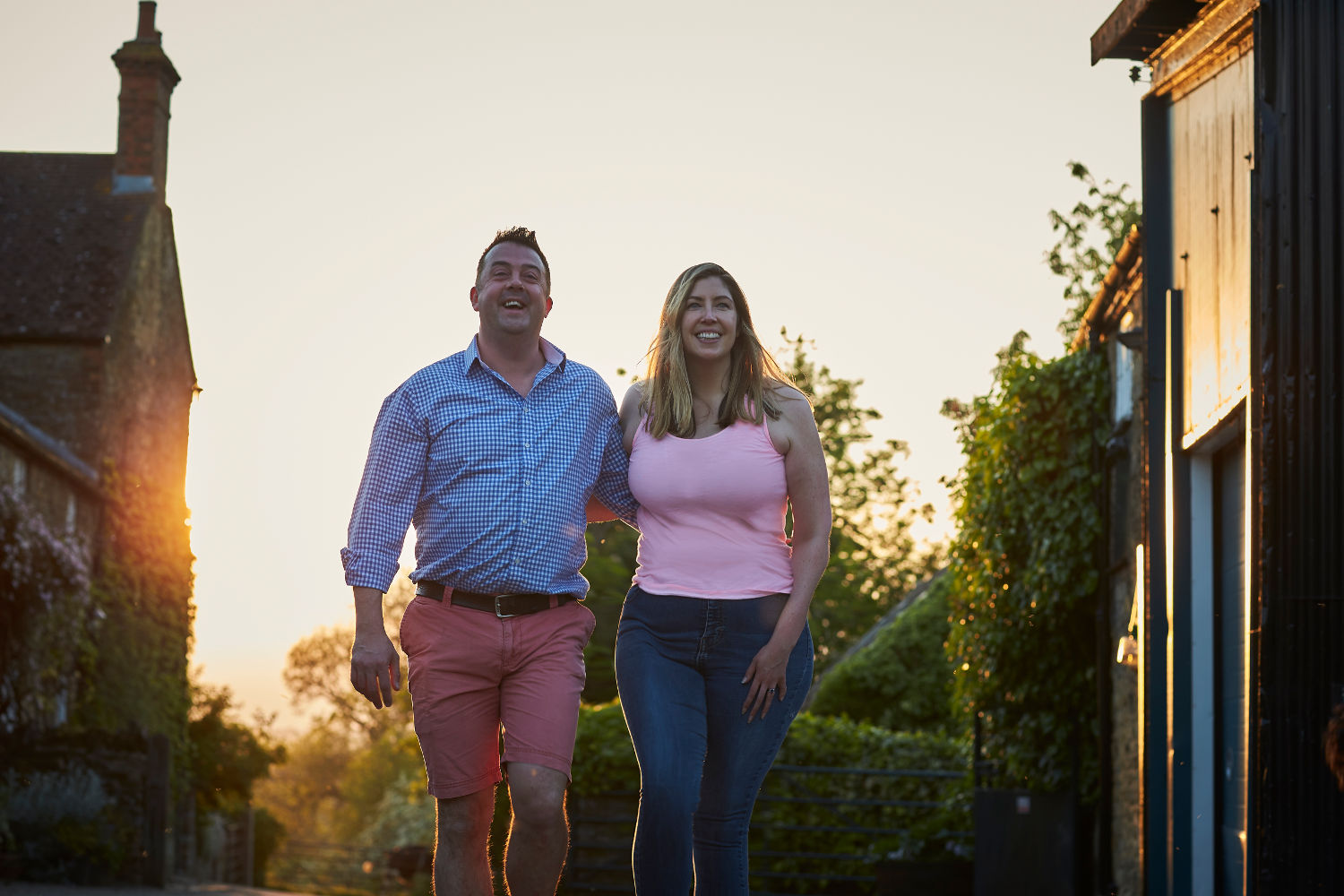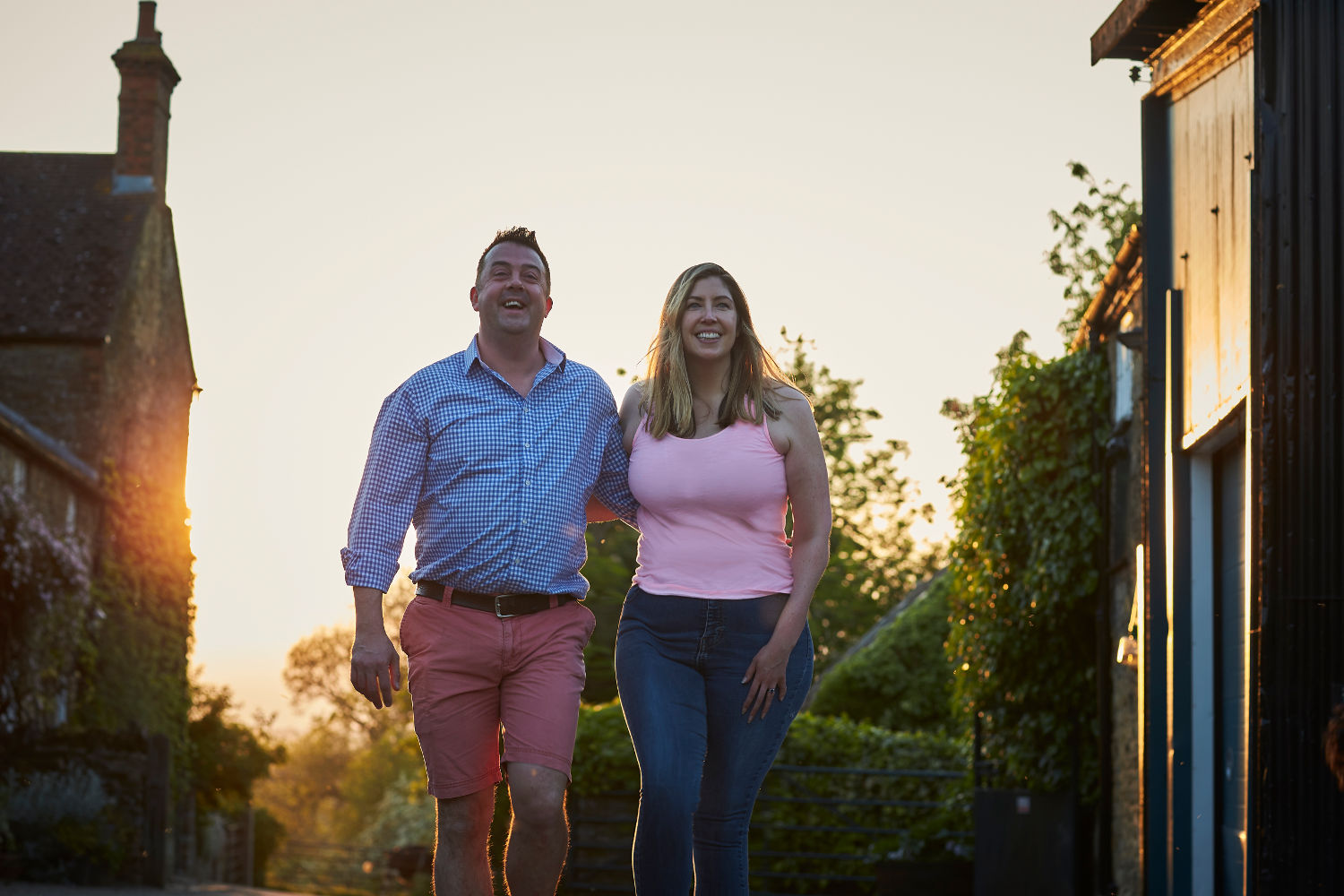Warner’s Distillery: remaining craft and sustainable!
Last month, Ryebeck reported on Think Gin‘s April debate around the growth of craft gin and future gin trends. Panellists also discussed whether on-trade sales can bounce back with pubs, bars and restaurants reopening. One successful craft gin brand is Warner’s Gin, a modern, forward-thinking business based on a family farm with sustainability at its very core.
Warner’s Gin: a craft brand that’s growing
Founder Tom Warner is a man on a mission … to make great gin from all-natural ingredients sustainably sourced or grown on his family farm. Since its beginnings almost ten years ago, his company has expanded considerably beyond its small scale production, while still maintaining its craft image.
Tom spoke at Think Gin spoke about his eco-friendly ethos and how he manages to balance his company’s craft image while also producing at scale. “We had unbounded ambition in terms of the growth we would bring in to the business“, says Tom. “However, we had no experience in the beer, wine or spirits industry. Also, we had never run a company or even owned a still when doing our business plan! So there was a huge amount we had to learn. What we had was the passion and drive to make it happen. We always wanted to make the best liquid, so needed to use the best process, the best equipment and the best ingredients to do so.”
Warner’s Gin: ahead of the game!
Tom’s business plans began around 2009/2010 when the gin landscape was completely different. “Brands were dominated by multinationals“, explains Tom, “but now craft has actually legitimised and helped the large companies!”
Having starting in 2012 before the real boom, Tom reflects on his feelings at the time. “We were slightly behind the curve with the resources that we had, but we benefitted from the surge within gin. Success turns luck into genius. Because we were right at the start, we were almost able to write the narrative and create the blueprint for what craft production is within the UK. Bound by ambition, we didn’t know how successful we’d become and how quickly. We started with no fear and aimed for the best!”
What does craft mean?
What is craft? It’s a tricky question to answer, but for Tom, it’s become an overused and abused marketing term. Does it, for example, mean small batch and when does a brand move from being craft to not being craft? “The context in business is important“, says Tom. “For us, it’s about making the best gin we can. It’s not relevant how much.”
Growing, but remaining ‘craft’
Does growing the business compromise on the ‘craft’ aspect? “We’re proud of the fact that we’ve never really cut corners“, says Tom. “One of the things we have changed is that we distil slightly bigger batches now than we used to. We only ever did one-shot. It’s been a real education for me.”
“One shot’s actually the easiest form of making gin”, he continues. Going into a concentrated multi-shot is really difficult when you’re scaling up. With quite small kit, we didn’t have the space to put in additional equipment. We’re now up to four stills at the farm. Two of those are actually quite small and they’re more for trials and limited editions. We have two 500L stills. Using them efficiently and scaling up means you have to put more skill into it! That’s perhaps one compromise we’ve made … but it’s probably better for consistency of product moving forward and it’s better for the environment. We’re still doing relatively small batches compared to the global brands.”
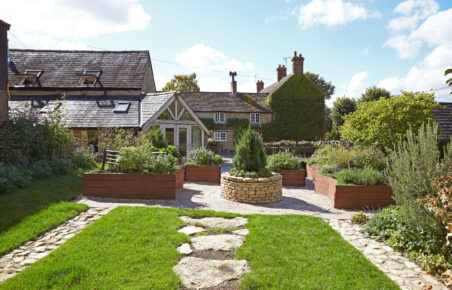
Warner’s Botanic Garden at Falls Farm
Farm-born ingredients
It’s clear listening to Tom that taking the easy option is not an option! Never far from his farming roots, Tom is committed to bringing as much of the operation in-house as possible. This means growing as many of the raw materials as they can, despite the vagaries of the British weather. “Our London Dry has had a recipe tweak, because it’s finally going to become farm born. We’ve expanded our growing on the farm by 200% this year … and can finally make the claim of ‘self-sufficient’ in our London Dry Gin with three of the botanicals that go into that. We believe we get a better liquid by growing the ingredients and harvesting them when we want. So it makes life a lot harder, but it’s the best thing for the liquid.”
Growing the business but keeping standards high
For a craft brand like Warner’s, growing the business does not mean sacrificing quality for pure commercial concerns, as Tom explains. “We’re not looking to cut corners and maximise profit, but to make the best possible liquid for the consumer. It’s all about setting the context of your business. If your goal is to launch a gin brand today and then sell it in five years’ time, you’re going to make certain decisions along that journey to maximise your volumes as quickly as possible and probably maximise your profitability too. I think craft is a bit more beautiful than that. It’s the pride and passion that goes into every single product we produce and it’s that care and effort. So, we’ve not really cut corners. If anything, we make our lives way harder than they need to be!”
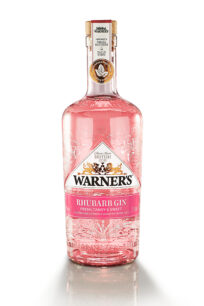
Warner’s Rhubarb Gin
Flavoured gin doesn’t have to be synthetic!
Tom gives the example of flavoured gin, a category that’s now worth roughly 40% of the gin category. It’s exploded since he launched his elderflower variant in 2013 and the world’s first rhubarb gin in 2016. “It kind of originated from our farm in terms of the elderflower and rhubarb that we launched to market“, he notes. “Unfortunately, it was like Pandora’s Box being opened. Unlike the synthetically flavoured products which may not even have been through a still, the way we make a flavoured gin is that it’s a London Dry that has real fruit juice added to it. Some of those crops are grown here at the farm. If you’re working with nature, you’re at the behest of nature. So we only add sugar to balance acidity, rather than just making an alcopop!”
Sustainability a core ethos for Warner’s
Tom has always maintained a focus on sustainability, a principle that is often spoken about within the gin category in particular. Like many other entrepreneurs, he sees this as vital for responsible, ethical and environmentally-conscious business practices.
“Last year we became 1% for the Planet members, so 1% of our revenues goes to support environmental issues. We’re on the journey to become a B-Corp certified business as well. It’s about investing for the future. Businesses are so often focused on making as much money as possible and I think that’s why we’re in the position that we’re in with the planet. We all need to be thinking about environmental issues. So there’s a whole evolution to go through. It’s really exciting that gin is this beacon at the moment. I think it’s also happening quite rapidly in rum now. The rum category is following suit and I think that’s because of the energy that’s within gin.”
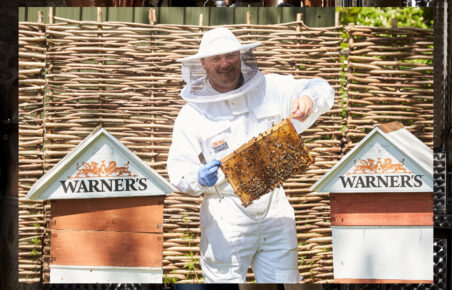
Beekeeping at the farm. The honey is used to make Warner’s delicious Honeybee Gin. Part of their sustainability and eco-friendly ethos, the bees keep the farm’s 10 acres of botanicals healthy too!
Craft – a force for good!
We all have an individual duty to protect the planet, at a time when the climate emergency is so evident. Tom is clear that businesses must play their part too. “It should be a driver for every business person on the planet. Very quickly, with the climate crisis that’s emerging, profitability’s going to be very difficult. Everybody’s on a journey hopefully within this. It’s not about being number one. It’s about everybody being as good as they can be to behave in a responsible way.”
“This is a really exciting, soul-enriching space to be in”, adds Tom. “If you have a business and can reduce your footprint on the planet, employ people, make some money at the end of the day and strive to be better, then that’s what we all need to be doing. It shouldn’t just be isolated to gin. The craft guys are in the unique position of being very young businesses. This means that they can put all this at the centre of what they’re doing and just be a force for good.”
My first ever taste of Tom’s Harrington Dry Gin, soon after he launched his company, convinced me to write more about gin! Hearing him speak again with such passion and honesty just reiterates the benefit of supporting smaller craft businesses that showcase the best ingredients to make the best products they can. His wise words also re-emphasise all our responsibilities towards combatting climate change.
If you’re looking to purchase high quality new or second-hand distillation equipment for your craft business, then Ryebeck can help. You can contact them on +44 (0) 800 689 3216 or via their online form.
Author: Robin Goldsmith of The Write Taste.
